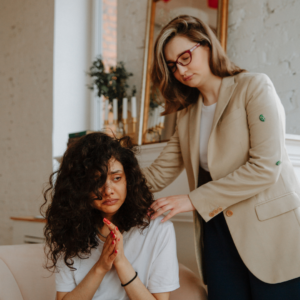How to Get the Most Out of Your Clinical Supervision Group
By Shannon Heers
You’re thinking about joining a clinical supervision group as a counselor, therapist or social worker. But you’re not quite sure what to expect. Or perhaps you just committed to joining a supervision group yet you’re wondering what you’ll get out of the group. You may prefer individual supervision, but have found that the benefits and affordability of group supervision is attractive. And you’re always up for expanding your horizons and learning more about the counseling field!
There are some things that you can do as a supervisee to get the most out of your clinical supervision group. Here are several ways that you can benefit the most from your group supervision.

Identify Your Learning Goals
What do you want to get out of your group supervision? Sure, you want a more affordable option for supervision than just individual supervision, but what else? Are you hoping to feel more comfortable discussing cases in group settings? Are you wanting to get several different perspectives on your clients? Or maybe you’re seeking connecting with other professionals. Whatever the reasons, make sure you identify at least a few different personal goals for yourself going into group supervision.
Learn About Your Supervisor

If you’re choosing to join a supervision group with a supervisor you haven’t worked with before, get to know your new group supervisor. You can ask for a resume, read their online bio, or seek out a phone consultation/call prior to joining the group. The better you know your supervisor prior to joining the group, the more comfortable you’ll feel speaking up in the group and knowing that it’s a safe place to learn.
Choose a Good Fit Group
If you have an option of different supervision groups to choose from, do some initial research to learn about the make-up of the group. Who are the other members? Will you fit in well, or are the most or least experienced therapist in the group by far? What are the specializations and theoretical orientations of the other group members? Does the time and location that the group meets fit into your schedule? These are important questions to ask when you’re determining which group will be a good fit for your needs.
Ask What Is Expected

It is important that you know what to expect coming into your first supervision group. This will help you feel less anxious and more able to be yourself. Ask your group supervisor how the group is run and what the expectations of the group members are. Is there a specific topic that will be discussed each group that you need to do research on? Or are you expected to come with a quick case presentation on one of your clients? The more you know, the more you can plan ahead and prepare (see below).
Come Prepared
Now that you know the supervisor and have found out your expectations for the group, it’s your job to come prepared. As a group supervisor, I always provide my group supervisees with a 5-minute case presentation format so they can prepare a case presentation for the group. A case presentation isn’t the only way to prepare for group, of course. You can bring up different professional issues that are relevant in your field, or something that you’re struggling with personally. Whatever you prepare, take a few minutes to think about it before group, and that is how you’ll get the most out of your supervision group.
Get to Know Other Group Members
Finally, you’re in group! The benefits of group supervision versus individual supervision include making connections with other group members that you otherwise wouldn’t have access to. Make a sincere effort to get to know your other group members. Ask questions about their style, their theoretical orientations and clinical interventions, and their work. Listen attentively and support them, and they will return the same courtesy.
How are you feeling now about joining a supervision group? Hopefully you have a better idea on how to get the most out of your group and are excited about your group supervision experience. Joining a supervision group can be anxiety-provoking, but the learning benefits can be immense. I recommend group supervision for every supervisee working on their licensure, and the more groups, the better.
How can we help
Check out our list of group supervisions that have openings!
Author Bio
 Shannon Heers is a psychotherapist, approved clinical supervisor, guest blogger, and the owner of a group psychotherapy practice in the Denver area. Shannon helps adults in professional careers manage anxiety, depression, work-life balance, and grief and loss. Follow Firelight Supervision on Instagram.
Shannon Heers is a psychotherapist, approved clinical supervisor, guest blogger, and the owner of a group psychotherapy practice in the Denver area. Shannon helps adults in professional careers manage anxiety, depression, work-life balance, and grief and loss. Follow Firelight Supervision on Instagram.



